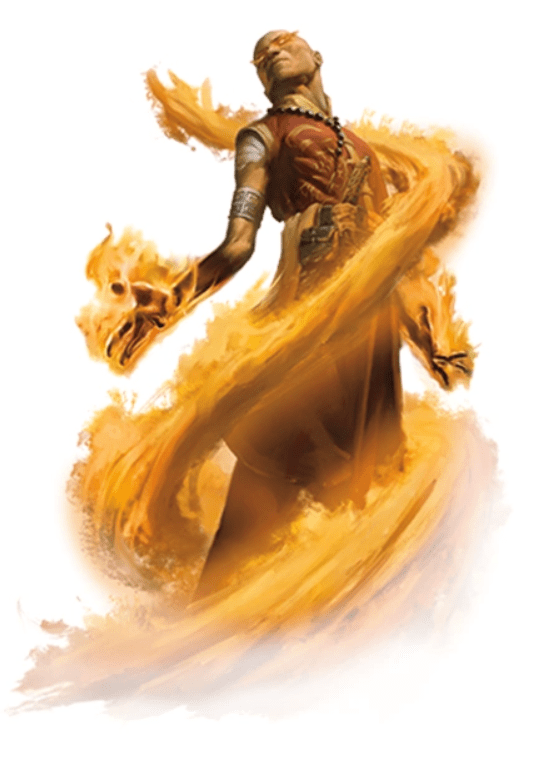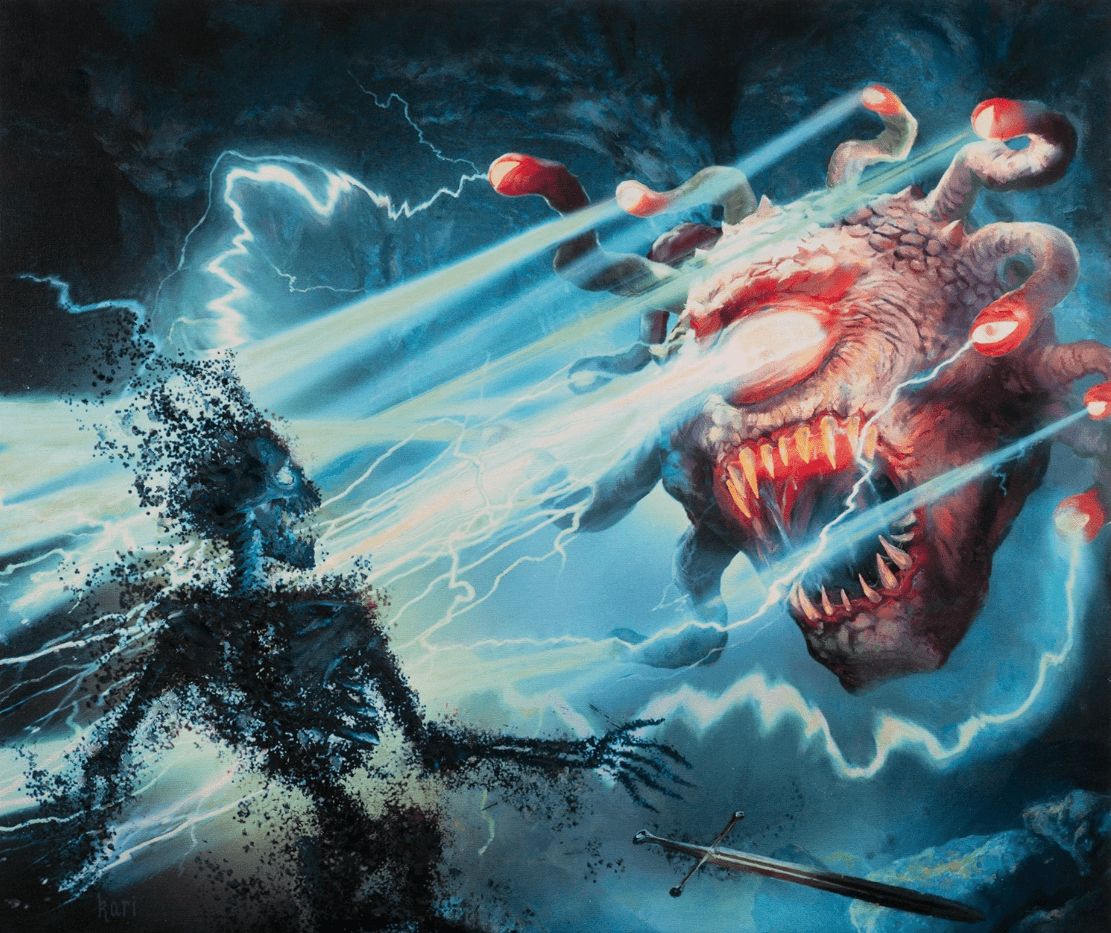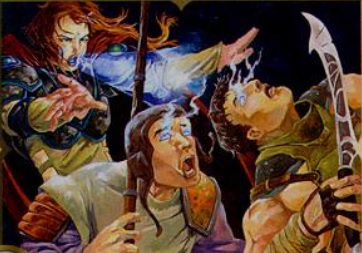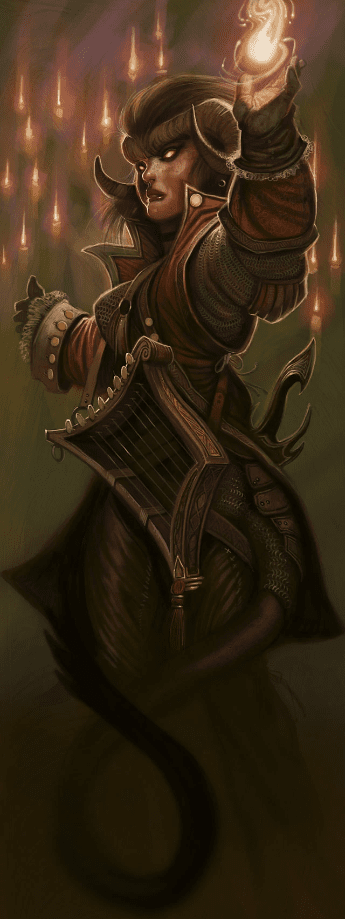Sticks and stones may break my bones, but words will never hurt me. Although a good saying in our day-to-day life, it may not hold up as well in the world of D&D.
In this fantasy world, people are killed at the utterance of a single, arcane enchanted word. Sticks and stones would be the least of my worries here. No D&D spell proves that better than Xanad’s Killer, or as well know it today in 5e: Power Word Kill.
I have had the pleasure and privilege of playing D&D for several years. One of my earliest fond memory of D&D lay in the feeling I got from killing my enemy by uttering a single word. Power creep is a genuine issue some players may feel. That being said, the ability to instantly erase something or someone would often be the peak of that hill.
I’ve been playing D&D for over six years now. In that time, I’ve come to experience the highs and lows of spells like Power Word Kill. With that, in this Power Word Kill 5e guide, I’ll be exploring and analyzing the potential and possible pitfalls this spell holds.
Power Word Kill Spell Specifics
The Player’s Handbook (PHB p.266) describes the casting of Power Word Kill as when a caster:
“Utters a word of power that can compel one creature you can see within range to die instantly. If the creature you choose has 100 hit points or fewer, it dies. Otherwise, the spell has no effect.”
The specifics of the spell are as follows.
| Casting Time | 1 Action |
| Range | 60 feet. |
| Target | One creature you can see within range |
| Component | V (Verbal) |
| Duration | Instantaneous |
Power Word Kill as a spell is a very straightforward spell. Does the enemy have less than 100 hit points?
Can you see your target within 60 feet of you? If you can ascertain both criteria, you’ve got yourself an instant kill at your convenience.
Origins and History of Power Word Kill (PWK)

Power Word Kill has been an available spell since the game’s first edition as a 9th-level Conjuration or Summoning spell. It became the school of enchantment spell we know today in the 3rd edition for the magic wielders. The potency of the spell has earned its place as a 9th-level spell and has not changed since its inception.
The spell’s original name, as mentioned, was Xanad’s Killer. This, alongside the Xanad’s lore, was first mentioned in the 2nd edition of the Player’s Handbook. Xanad was a merciless Netherese (human) arcanist in life. His prominence in the world of Faerun during his lifetime was due to his spell-crafting ability. He was killed at the age of 290 at Netheril at 683 DR.
The spell was also showcased in Magic The Gathering as a black mana instant card. Released in 2021, it came with the flavor text “Aramil issued a long, heroic challenge, then the lich felled him with a single word.”
Who can cast Power Word Kill?
This lore-rich spell would later be available to the bard, warlock, sorcerer, and of course, wizard in 5e. They gain access to the spell whenever they can cast a 9th-level spell. They can also decide to chance it with a 9th-level scroll holding the spell.
The Eldritch Knight Fighter and the Arcane Trickster rogue can also attempt to cast this spell through a scroll. They can do so because they share the same spell list as the Wizard.
Bard

Bards gain access to this at the 17th level. Their charismatic nature imbues them with the inspiration to find the spell, allowing them to prepare and cast it. It would be apt to see any bard, but more specifically eloquence or whispers bards to have them handy.
A fun way to flavor the use of Power Word Kills as a bard would be to do so while making them look like accidents. They could be walking by and whisper to a well-researched target, or letting melodies carry their words to a victim during a performance.
Warlock

Unable to naturally cast this 9th-level spell, Warlocks receive it instead as a Mystic Arcanum at the 17th level. As malefic contractors of a greater being, they channel power from their benefactor.
A classic way to roleplay PWK for a warlock is to have them possessed by their Patreon. Eyes glazing over as their voice doubles and booms across the field, falling their victim.
Sorcerer

As the most arcane inclined class in the list, mana literally flows through the sorcerer or sorceress’ veins. Their magical heritage makes spells come to them as if it’s second nature.
Sorcerers that have dark backstories are ideal candidates to have this spell in their repertoire. They gain the ability to do so at the 17th level.
Wizard

They’re the ones who have the most in lore reason to be able to learn and use this spell. Wizards understand spells as if they’re an equation to be mastered.
The Wizard, as described in (PHB p.112), can copy the PWK spell after 18 hours and 450 gold. This can be done given that the Wizard is already level 17. Doing so makes PWK a part of their known spells.
Is Power Word Kill a Good Spell?
The long and short of it is that PWK is a good spell. As a 9th-level spell, it is a decent choice given the proper situation and setup. But, I wouldn’t go as far as to say it is a “must have” spell, and here’s why.
What Makes it Good?
- Simple and straightforward to use
- Potential of instant killing
- Powerful roleplaying and character moment
What makes PWK a good spell to me lies in its potential rather than its practicality. Few 9th-level spells come with only one or two sentences of text. Several 9th-level spells are paragraphs long and riddled with stipulations and conditions. This complexity can easily scare away a new spell caster.
There is beauty in simplicity. This is the case when the same simple spell saves the party from tense, uncertain encounters. Players can also orchestrate many chilling moments with this spell. Doing so can easily fulfill any of their power fantasies.
What Makes it Bad?
- Easily reversible/countable
- There are arguably better options.
- It is always a gamble to use
Looking through the lens of a player, you would often only ever have one 9th-level spell. The promise of a potential instant kill is often tempting. But, when arguably more versatile options are presented, practicality comes into question. Spells like Imprisonment can fulfill the same role if the goal is to end or skip a fight.
Other spells, like Gate or True Polymorph, could also give the caster and their party more mileage. Even lower-leveled spells, when upcasted, could better fulfill certain user demands. All these factors make PWK being a “must have” spell a hard ask.
The setup for the spell is also arduous when using the spell against spell casters. A well-placed counter spell or invisibility could jeopardize your sole 9th-level spell. The use of spells is also a gamble when it’s against strong, end-game creatures.
This is the case due to their legendary resistance and other magic defenses they may have. Given this, the right scenario is rare to come by, even when the correct guesswork is made to gauge the health of the target.
Spells with Similar Effects

Although a Dungeon Master would have several options to inflict instant death (i.e., a banshee’s scream, a Beholder’s death ray, a Vampire’s bite, etc.), there aren’t as many options available to a player. PWK may have a reasonable amount of pitfalls, but a player would be hard-pressed to find any other non-homebrew instant kill spells.
No spell can fell a target the way PWK can. The closest spell option would be a well-struck Disintegrate. A Vorpal Sword may also do the trick on an enemy with a head if one is to look at the options found in weapons. When upcasted, one can argue that any heavy-hitting spell can do the same as PWK.
Yet none of them quite fulfills the same niche that the spell can provide when it comes to its potential. This is especially so when the context is that of a player’s power fantasy or big moment in the campaign.
The Other Power Word Spells
Xanad, in his time, also created other power word spells that made it to the list of spells known to the D&D world today. A noticeable pattern to all the power words is that they have the same cast time and duration.
Power Word Pain
This 7th-level spell is the latest addition to the list of Power Words from Xanathar’s Guide to Everything (XGE p.163). This enchantment-type spell targets a creature that is 100 HP or less, given that they can be charmed.
The spells make the victim unable to move more than 10ft at a time. On top of this, they are also given disadvantage in their ability checks, attack rolls, and saving throws that aren’t tied to Constitution.
Spell users must also succeed in a Consitution save or waste and be unable to cast their desired spell. They can only attempt to save from this spell again at the end of each victim’s turns. This spell is available to the Sorcerer, Warlock, and Wizard classes.
Power Word Stun

As an 8th-level enchantment type spell (PHB p.267) describes, the spell can stun a creature with 150 HP or below. The stunned target can then attempt to make Constitution saves to escape being stunned at the end of each turn.
This spell is available to the Sorcerer, Warlock, Wizard, and Bard classes.
Power Word Heal

The direct opposite of Power Word Kill, this 9th level evocation type spell (PHB p266) differs from the other three powerful words. The spell has the range of touch while having a somatic component on top of the verbal one.
This spell has the target regain all their hit points. They are also cleansed of several harmful effects that may be in play. This spell cures the frightened, charmed, paralyzed, or stunned effects. A prone creature can also stand using their reaction. The spell does not work on constructs or undead and can only be used by the Bard and Cleric classes.
Usage
There are a lot of setups, nuances, and factors involving a successful use of the PWK spell for both DMs and players. Having that said, as a player, you want to be smart with the trigger of that spell. Having the spell at hand usually means you are already at least level 17.
At that stage, your DM is running content that is meant for Tier 4 characters. Challenging conditions and high stakes become the norm. On top of this, creatures are usually HP-heavy and come with magical resistances.
Because of that, queues such as the DM’s descriptions of the target’s physical appearance are very important. Clocking when the creature becomes bloodied gives the user a higher chance of successfully pulling off the spell.
Another thing to note would be the target’s legendary resistance. It’s good to note when a foe you’ve faced has legendary resistance. It is also safe to assume in later tiers that monsters have some type of magical resistance or defense.
Doing this while noting how many your party has burned throughout an encounter is key. This could prevent an early spell attempt from fizzling out or failing.
Out of combat, there are many creative ways the player can set up a power word kill for the sake of roleplaying. You could use it as a show of force or a tool of intimidation. Poisons are also a popular precursor to weaken a target, readying them for the spell to be used.
As mentioned, this spell shines the most when coupled with a well-thought-out plan. As a player, you won’t complain either when a gamble pays off and a foe falls at the very sound of your voice.
FAQ
Question: How would you change PWK to make it more interactive or exciting to use?
Answer: It is reasonable to think death should be instant. But some views portray death as something slow and crippling. One way I would change PWK in a homebrew situation is to have it as a timed debuff. The caster can curse a target with the spell. While cursed, their HP will drop by 25 at the end of each turn once their HP hits 100 or below. The spell instantly kills the target if it reaches 0. The mark will be cleansed, or the spell will fizzle only if the caster is killed or an hour passes without the target’s HP dropping to 100 or below.
Question: How should a DM use PWK without feeling like it’s cheating or a cop-out?
Answer: Set up and build-up is critical. Although a bit meta or out of game, rolling against your players can be used as your build-up. This can entail having your players see you make intelligence or wisdom (insight) checks. Then allowing them to counter with charisma (deception) checks. The back and forth could provide a fun, albeit tense, back and forth for the PWK.
Showing your players their foe to use the spell before their final clash can also increase its fairness. Having seen it, they can now prepare for it. As the DM, you shouldn’t be too scared to equip a powerful foe or the Big Bag Evil Guy (BBEG) of your campaign with this spell. Experienced tables would learn to fear trickier spells. The likes feeble mind more than they may complain about a well-placed PWK.
Question: What type of Damage does PWK deal?
Answer: It doesn’t do any damage; it’s written as an instant kill once the target is below a 100 HP threshold.
Question: What Monsters can use PWK?
Answer: The only written example readily available would be that of the Lich. You, as the Dungeon Master, could also give the spell to other monsters and spell casters you’ve edited and made. Some of my top choices would be Vampire Lords or high-level Fiends and Demons. For example, a friend told me a story of a “hard mode” Curse of Strahd. Here the DM equipped Strahd with Fighter/Sorcerer levels for a fully geared tier 4 party.
Question: Does the Polymorph + PWK combo work?
Answer: I’m on the side that says it does work. Reading the writing of both spells, PWK kills any target below 100 HP. Polymorph transforms a creature into another and reverts only once the creature’s HP hits 0 or dies. Seeing as the spell instantly kills the creature, the creature polymorphed or not is the same. The polymorphed creature would revert but remain dead.
Given the context, important creatures or characters ran in campaigns are relatively strong. They would have legendary resistances, magic resistances, or high save bonuses. Spell casters could even have counterspells; having said that, I wouldn’t worry too much about it. If ever it happens, it makes a funny or cool story to retell.
To Conclude
Nothing satisfies power creep like an instant kill. That instant kill can be found by the proper use of the Power Word Kill spell. This conditionally powerful spell with the appropriate setup has a huge payout. It can potentially provide very compelling character moments. Heartbreaking character deaths wouldn’t be too farfetched when used against a party.
In the end, despite the shortcomings of the spell, it shouldn’t take away from its usability. Neither DM nor player should be discouraged from planning and using this spell. For better or worse, it’s all part of the bigger D&D and TTRPG experience.
- Power Word Kill 5e Guide: Fulfill Your Dramatic Power Fantasies - August 21, 2022
- Dhampir 5e Guide - August 14, 2022
- DnD One Shot Ideas - July 23, 2022


